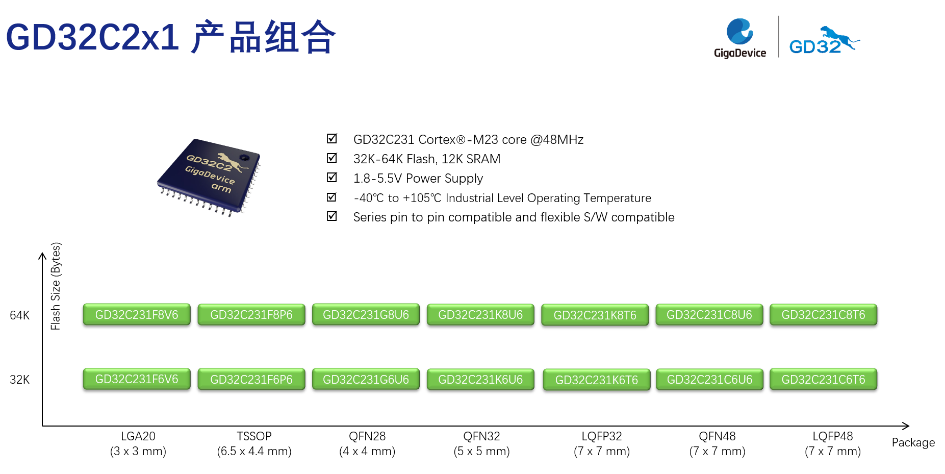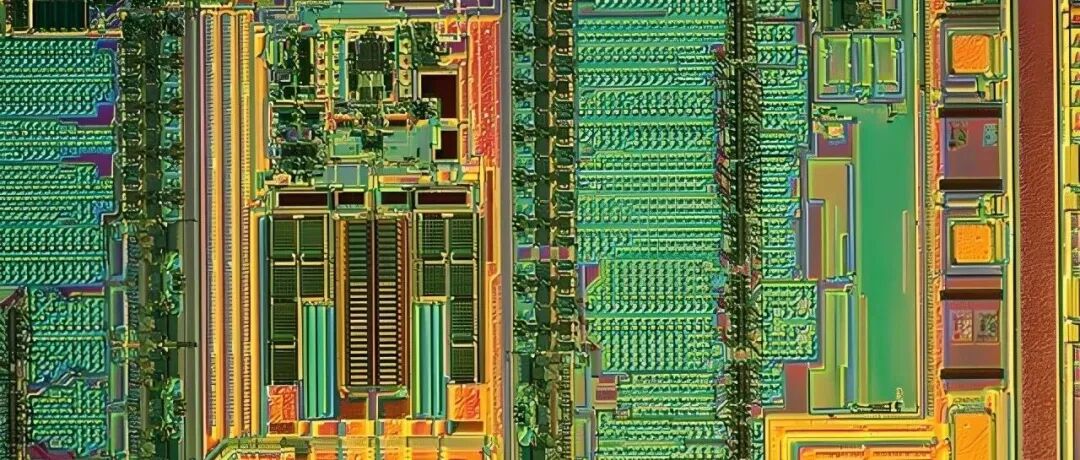As market demands continue to evolve, 8-bit MCUs are gradually being replaced by ‘low-end’ 32-bit MCUs, prompting major MCU manufacturers to enter the 32-bit ‘low-end’ MCU space.
On June 5, GigaDevice officially announced the launch of the value-oriented GD32C231 series entry-level microcontrollers.
GD32C231 Series MCUs: The Ultimate Cost-Performance Choice
The GD32C231 series MCUs significantly enhance computational performance and peripheral specifications while maintaining excellent price competitiveness, achieving a substantial cost-performance upgrade. This series adopts Arm®’s advanced Cortex®-M23 core architecture, offering a 10% performance improvement over Cortex® M0+, with a maximum frequency of 48MHz, featuring efficient processing capabilities such as single-cycle multiplication and integer division, greatly improving software execution efficiency.
In terms of memory configuration, it is equipped with 32KB to 64KB of high-reliability embedded Flash and 12KB of low-power SRAM, with ECC error correction functionality across all memory areas. To meet the needs of various application scenarios, it offers multiple packaging options including TSSOP20/LGA20, QFN28, LQFP32/QFN32, and LQFP48/QFN48. The highly integrated chip design effectively reduces the number of external components, providing users with a more cost-effective Bill of Materials (BOM) solution.

△GD32C231 Product Portfolio
Perfect Balance of Wide Voltage, Low Power, and High-Speed Wake-Up
The GD32C231 features excellent power flexibility and low power characteristics, supporting a wide voltage supply of 1.8V to 5.5V and a wide temperature operating range of -40℃ to 105℃, making it suitable for various harsh environments. The chip offers multiple power management modes, with a current of less than 5μA in deep sleep mode while maintaining a fast response speed, with a wake-up time of 2.6μs, perfectly balancing low power consumption and real-time requirements, empowering battery-powered and portable device applications.
The GD32C231 also excels in safety and reliability: outstanding anti-static capability, achieving high standards of ESD protection with contact discharge of 8KV (CD) and air discharge of 15KV (AD); all Flash/SRAM employs ECC error correction design to effectively prevent data errors; and it integrates a hardware CRC cyclic redundancy check module to ensure the integrity and reliability of data transmission. These features enable the chip to operate stably in industrial control, automotive electronics, and other fields with stringent safety requirements.
Highly Integrated Peripheral Resources Empowering Diverse Application Scenarios
The GD32C231 integrates a wealth of peripheral resources, significantly enhancing system integration and application flexibility: it includes a 12-bit ADC (supporting 13 external channels) and 2 internal comparators to meet precision measurement needs; and provides up to 4 general-purpose 16-bit timers, 1 16-bit advanced timer. It is equipped with 2 high-speed SPI interfaces (supporting four-wire QSPI mode, with a rate of 24Mbps), 2 I2C interfaces (supporting Fast Mode+, with a rate of 1Mbit/s), and 3 UARTs (with a rate of 6Mbps), integrating 3 DMA controllers and 1 I2S, ensuring efficient communication capabilities.
It also offers excellent GPIO expandability, supporting up to 45 GPIOs in a 48-pin package, significantly enhancing hardware design flexibility. These professional configurations enable the chip to easily handle diverse application scenarios in industrial control, consumer electronics, and more.

△GD32C231 Specification Block Diagram
Full-Stack Ecosystem Resources Ready for Efficient Development Loop
The GD32C231 series provides complete development ecosystem support, helping developers quickly realize product implementation. The official website has fully launched a standard resource library.
GigaDevice offers comprehensive development support documentation and resources, including data sheets, user manuals, hardware design guides, application notes, and porting documents, assisting developers in quickly getting started with hardware design and software development. It also provides a complete SDK firmware library, containing rich example programs and development board materials, covering a full set of solutions from low-level drivers to advanced applications, accelerating the product development process.
The GD32 series MCUs widely support FreeRTOS, providing embedded developers with a lightweight, open-source, and efficient real-time operating system (RTOS) solution. GigaDevice also offers its self-developed GD32 Embedded Builder IDE integrated development environment, which combines graphical configuration and intelligent code generation features, significantly reducing development difficulty; the all-in-one programming tool GD32 All-In-One Programmer supports basic operations such as programming/erasing/reading the MCU’s Flash and option bytes. The accompanying GD-Link debugger supports dual-mode debugging of SWD/JTAG, plug-and-play, providing a smooth debugging experience, and has in-depth cooperation with multiple programming manufacturers to offer customers various programming and debugging options.
Additionally, the GD32C231 series MCUs have received comprehensive support from major international toolchain vendors such as Arm® KEIL, IAR, and SEGGER, ensuring diversity in the development environment. For typical application scenarios, GigaDevice also provides a wealth of solutions and reference designs, significantly shortening the cycle from development to mass production, providing efficient and reliable solutions for customers across various industries.

Principles and Methods of Implementing OLED Display via MCU through I²C

Common Issues with Stack Size in RTOS Tasks

Do Microcontroller Hardware Itself Have Bugs?